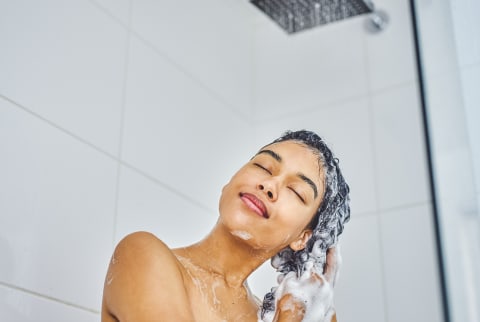Advertisement
Heads Up: You're Probably Using Dandruff Shampoo Wrong


Collective groan: There's no current "cure" for dandruff. You can, however, mitigate some of the symptoms (itching, scaling, a sprinkling of flakes), with a designated shampoo—these lathers are potent enough to reduce buildup while easing inflammation on your scalp. Considering seborrheic dermatitis on the scalp (aka dandruff) affects almost half the adult population worldwide1, you might have a bottle or two of your own within reach.
Just pause before dousing your strands: "You're probably using your dandruff shampoo the wrong way," says board-certified dermatologist Angelo Landriscina, M.D., over TikTok. Here, he shares the dandruff shampoo mistake he sees all the time (and how to fix it).
Why you're probably using dandruff shampoo wrong.
You don't want to use OTC medicated shampoos just like any other rinse—that's because their main gig is to help with scaling and itching, not to simultaneously cleanse and infuse the strands with nutrients. Ingredients like ketoconazole and selenium sulfide (common lab-derived players in dandruff shampoos) are potent antifungals, sure, but they're not particularly good for the hairs themselves. "[They] can be pretty drying, stripping, and not great for all hair textures," says Landriscina.
Even natural-leaning dandruff shampoos with clarifying agents like tea tree, salicylic acid, and apple cider vinegar can dry out the strands when used too often. The bottom line? "You're not really meant to wash your hair with these," Landriscina continues. "Dandruff shampoo is for your scalp."
This may have you wondering: Uh, how do I wash my scalp but not my hair? After all, you can't exactly rinse out the suds without it running down the lengths of your hair. You're absolutely right, but Landriscina focuses on the actual scrubbing, here: If it comes into contact with your strands, that's fine, but you don't want to massage a dandruff shampoo anywhere but your scalp, especially if you use a medicated number.
What to do instead.
"The next time you use dandruff shampoo, do this: Massage it onto the scalp, leave it on for two to three minutes, then wash the rest of your hair with whatever shampoo you like," says Landriscina. Especially if you notice some stray flakes sprinkled within the lengths of your hair, a good wash with your usual lather may do the trick—you don't necessarily need to scrub the ends with the same antifungal shampoo.
After any good cleanse, following up with a hydrating conditioner is crucial, so you can deliver moisture back into the strand. (Our favorites, here, should you find yourself needing a refill.) If you have extra dry and fragile hair, you can even apply a moisturizing conditioner on your lengths before you cleanse—this creates a barrier so the shampoo isn't as potent on your ends.
The takeaway.
If you use a dandruff shampoo, make sure you don't neglect the rest of your hair. Flakes may be your most pressing issue at the moment, but dryness is no fun, either. Of course, some formulas (mainly natural-leaning products) do come buffered with good-for-hair ingredients, but they can still be stripping, especially if you use them too often.